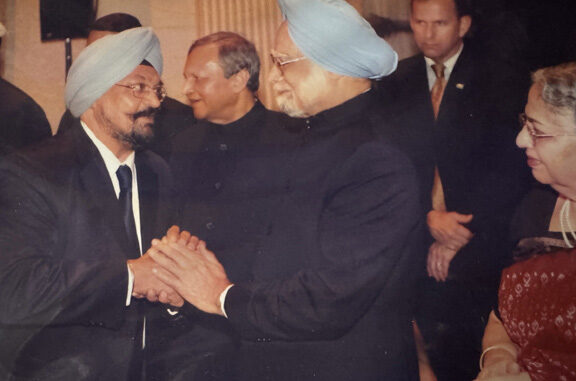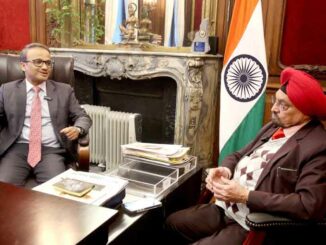
The passing away of Dr. Manmohan Singh, India’s former Prime Minister, marks the end of an era in Indian politics and economic thought. Known for his quiet demeanor, profound intellect, and relentless commitment to public service, Dr. Singh leaves behind an indelible legacy that will continue to shape India and inspire the world for generations to come. This tribute seeks to capture the essence of his life, his achievements, and his contributions to both national and international spheres.
To me, it is a personal loss. I had the opportunity to know and meet him, and interact with him. I studied his economic thought, and it is there for the world to see how transformative were his economic ideas. He was the man who built a solid economic structure of India. The simple and unostentatious man will be remembered as a builder of a colossal India.
I am tempted to trace the life of this gem of a person for the younger generation of Indians, particularly, the ones here in America, who have been fed for too long with all kinds of lies about this great man. It will be worthwhile to know him.
Dr. Singh’s early life and education
Dr. Manmohan Singh was born on September 26, 1932 in Gah, a small village in the Punjab region of British India (now in Pakistan). His early years were marked by the tumultuous partition of India in 1947, during which his family migrated to India. Despite the hardships, Dr. Singh’s academic brilliance shone brightly.
He pursued his undergraduate degree in Economics from Panjab University and went on to earn a master’s degree from the same institution. His quest for knowledge took him to the University of Cambridge, where he completed another degree in Economics. Dr. Singh then pursued his DPhil in Economics from the University of Oxford, specifically Nuffield College, writing his doctoral thesis on “India’s Export Trends and Prospects for Self-Sustained Growth.”
Professional Career and Early Contributions
Dr. Singh began his illustrious career in academia as a professor of Economics at Panjab University and later at the prestigious Delhi School of Economics. However, his transition to policymaking and governance marked a turning point in his journey. In 1971, he was appointed as an Economic Advisor in the Ministry of Commerce and Industry, followed by a series of prominent roles:
Chief Economic Advisor (1972-1976): Dr. Singh’s insights played a key role in shaping India’s economic policies during a challenging period.
Governor of the Reserve Bank of India (1982-1985): His tenure as RBI Governor was marked by efforts to stabilize India’s financial system.
Deputy Chairman of the Planning Commission (1985-1987): Dr. Singh contributed significantly to the nation’s long-term economic planning.
Architect of Economic Reforms
Dr. Singh’s most defining role came in 1991 when he was appointed as India’s Finance Minister in the government led by Prime Minister P.V. Narasimha Rao. India was facing a severe economic crisis, with depleting foreign exchange reserves and soaring inflation. Against this backdrop, Dr. Singh unveiled a series of groundbreaking economic reforms, including:
Liberalization: Opening up India’s economy to global markets by reducing import tariffs and encouraging foreign investment.
Privatization: Reducing government control over key industries.
Globalization: Integrating India’s economy with the global market.
His visionary approach transformed India into one of the fastest-growing economies in the world. His iconic statement during the 1991 budget speech, “No power on Earth can stop an idea whose time has come,” became emblematic of India’s newfound confidence.
Tenure as Prime Minister
Dr. Manmohan Singh served as the 13th Prime Minister of India from 2004 to 2014, heading the United Progressive Alliance (UPA) government. As Prime Minister, his tenure was marked by remarkable achievements:
Economic Growth
Under his leadership, India achieved unprecedented economic growth rates, often exceeding 8% annually. Key initiatives included:
National Rural Employment Guarantee Act (NREGA): Providing a safety net for rural households.
Right to Information Act: Promoting transparency and accountability in governance.
Accelerated Infrastructure Development: Expanding roads, ports, and power projects to sustain economic growth.
Nuclear Deal with the United States
Dr. Singh’s efforts to secure the historic India-U.S. Civil Nuclear Agreement in 2008 underscored his diplomatic acumen. This agreement not only ended India’s nuclear isolation but also paved the way for strategic partnerships in science, technology, and defense.
Social Welfare
Dr. Singh’s administration introduced landmark programs in education and healthcare, such as the National Health Mission and the Right to Education Act, aiming to uplift millions from poverty and illiteracy.
Contributions to International Relations
Dr. Singh’s tenure saw India emerge as a key player on the global stage. He was instrumental in forging strong ties with major powers, including the United States, Russia, China, and Japan. His advocacy for South-South cooperation and his emphasis on combating climate change earned him international acclaim.
Under his leadership, India gained greater prominence in multilateral forums such as the G20, BRICS, and the United Nations. Dr. Singh’s measured and thoughtful diplomacy earned him respect among world leaders, many of whom sought his counsel on global economic and geopolitical issues.
Personality and Legacy
Dr. Manmohan Singh was a leader of few words but immense wisdom. Known for his integrity, humility, and steadfast dedication to the nation, he inspired admiration across party lines. Despite facing criticism during his second term as Prime Minister, particularly regarding corruption scandals, his personal reputation remained untarnished.
His ability to navigate complex economic challenges, coupled with his unwavering commitment to the welfare of India’s citizens, cemented his status as a statesman of rare caliber. His academic rigor and pragmatic approach to policymaking set him apart as a leader who prioritized the nation’s interests above all else.
Tributes from World Leaders
Dr. Singh’s demise has elicited heartfelt tributes from leaders worldwide:
Joe Biden, President of the United States: “Dr. Manmohan Singh’s vision and leadership were pivotal in strengthening U.S.-India relations. His wisdom and kindness will be deeply missed.”
Narendra Modi, Prime Minister of India: “India has lost a great leader and scholar. Dr. Singh’s contributions to our nation’s development will always be remembered.”
Rishi Sunak, former Prime Minister of the United Kingdom: “Dr. Manmohan Singh’s economic reforms and global vision elevated India on the world stage. His legacy is one of hope and progress.”
Christine Lagarde, President of the European Central Bank: “Dr. Singh was a towering figure in global economics. His insights and humility left an indelible mark on international policymaking.”
Dr. Manmohan Singh’s life was a testament to the power of knowledge, integrity, and perseverance. From his humble beginnings to becoming one of the most respected leaders in the world, he exemplified the values of hard work and selfless service.
As India mourns the loss of one of its greatest leaders, the world remembers Dr. Singh as a visionary economist, a transformative Prime Minister, and a statesman who believed in building bridges rather than walls. His legacy will continue to guide India and inspire future generations to dream big and act with courage.
Rest in peace, Dr. Manmohan Singh—a true architect of modern India.





428233 994726Ive the same problem sometimes, but I normally just force myself via it and revise later. Excellent luck! 160422